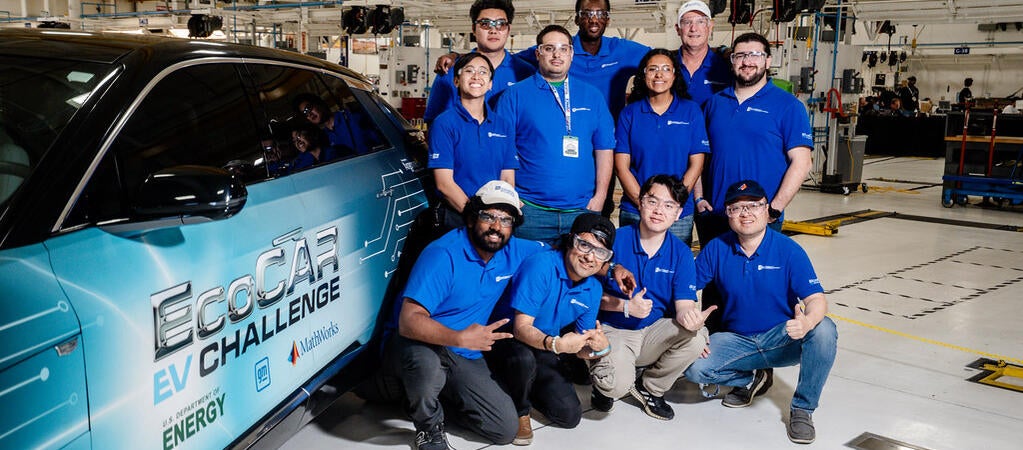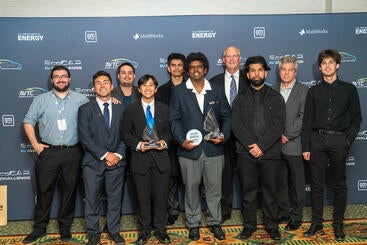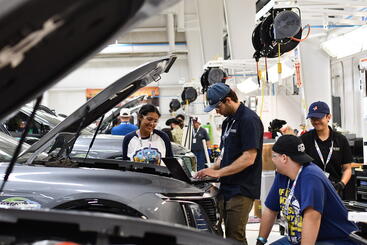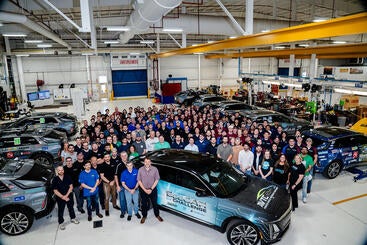Forged Through Adversity: UCR EcoCAR Team’s Year 3 Journey
June 27, 2025
In May 2025, the UC Riverside EcoCAR team competed in the Year 3 EcoCAR EV Challenge, continuing its role in a
national initiative to train the next generation of clean mobility engineers. Hosted by the U.S. Department of Energy and managed by Argonne National Laboratory, the competition brought together 15 universities, over 200 students, and representatives from nearly 20 industry sponsors. This year’s event spanned two high-pressure phases—vehicle testing in Yuma, Arizona, and presentations in San Diego, California—offering a rigorous evaluation of each team’s technical capabilities, problem-solving under pressure, and project management execution.
The competition centers on reengineering a 2023 Cadillac LYRIQ to improve its energy efficiency, automation features, and overall performance. UCR’s team arrived in Yuma with months of preparation behind them and a singular goal: to validate and demonstrate the full integration of their vehicle system. The team immediately faced the demands of on-site integration, troubleshooting electrical faults, adjusting system schematics, and completing hardware installations under intense time constraints. Early complications with the electronic transmission range select (ETRS) system and intermittent power issues challenged the team’s ability to isolate faults and maintain progress, yet their methodical approach and effective communication enabled them to push through critical technical bottlenecks.
By midweek, the vehicle had encountered several unrecoverable states that risked disqualification from key evaluation stages. Instead of stepping back, the team doubled down, stabilizing high-voltage systems, refining cable management, and revalidating all safety-critical components. Their persistence paid off. UCR passed Vehicle Technical Inspection and successfully completed the Low Speed On-Road Safety Evaluation. The team also earned full points for their Driver Monitoring System demonstration, highlighting both the accuracy of their sensor integration and the strength of their software calibration.
However, the week was not without setbacks. Just as the team was preparing for the final Ride and Drive showcase, a thermal management failure caused a critical coolant leak, forcing the vehicle to withdraw from the last event. Though disappointing, the failure served as a powerful reminder of the fragility of complex systems under sustained operational stress and offered valuable real-world insight into durability limits and contingency planning.
The second phase of the competition transitioned from vehicle performance to technical communication and strategic review. In San Diego, the team presented its work across multiple domains, including propulsion controls, connected and automated vehicle development, systems design, risk analysis, and outreach strategy. Judges from government agencies, national laboratories, and major automotive partners evaluated both the depth of engineering and the clarity of the team’s systems thinking.
The competition culminated in several honors that recognized the UCR team’s character and contributions. The
Spirit of the Challenge Award celebrated their teamwork, resilience, and positive attitude throughout the program. The Excellence in Leadership Award was presented to Nilesh Balusu for his ability to guide the team through the high-pressure environment with focus and integrity. Additionally, Will Snyder received a special technical acknowledgment for supporting Argonne National Laboratory in setting up the Adaptive Cruise Control (ACC) evaluation during a parallel demonstration at the California Air Resources Board (CARB), reinforcing the team’s broader impact beyond the competition itself.
The EcoCAR EV Challenge is more than a student competition; it is a proving ground for the technologies and leadership that will define the next generation of clean transportation. For the UCR EcoCAR team, Year 3 served as both a technical milestone and a formative learning experience. From system integration under pressure to presenting high-level strategies to experts in the field, the team continues to demonstrate the value of interdisciplinary collaboration and innovation rooted in real-world engineering challenges. As they prepare for the final year of the challenge, their momentum reflects CE-CERT’s broader mission: advancing sustainable mobility through applied research, education, and technical excellence.



